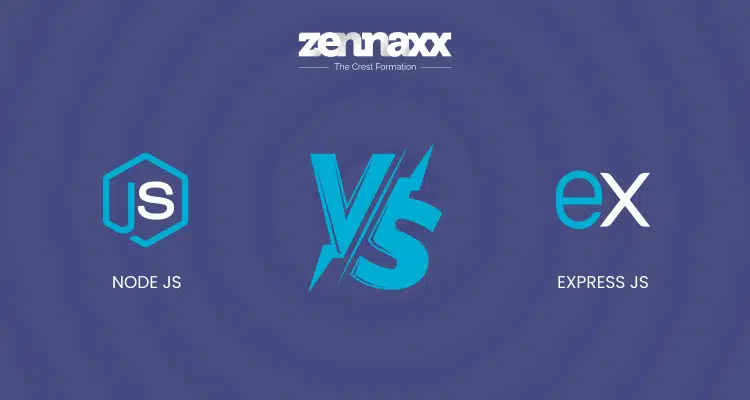Many industries and organizations are confused about choosing the Node.js vs Express.js technology for the future.
There are two flexible frameworks: Node.js development and Express.js development. Express.js and Node.js -based framework that makes developing web applications less complex.
Both are great in their own ways and features, but in this blog, we clarify when to choose Node.js development and when you can get more benefits from Express.js development.
So let’s understand Node.js vs Express.js.

What is Node.js?
You can run JavaScript on the server side with Node.js, which is fully free and open source. It works incredibly well for creating scalable, quick web apps.
Node.js is capable of handling many jobs at once without slowing down. The V8 JavaScript engine is what powers it.
This makes it perfect for online chat rooms and other real-time functions. Event-driven design and non-blocking I/O make it easy for Node.js to respond quickly in the development process.
It also comes with a lot of tools and frameworks, such as Express.js, that make making web apps easier and faster.
Key features of Node.js
Asynchronous I/O
Node.js doesn’t block while doing I/O jobs because it handles asynchronous operations well. Being able to handle many connections at once makes it very scalable.
1. Event-Driven Architecture
Node.js operates on an event-driven approach, in which events cause actions. This makes it easier to create responsive and scalable apps.
2. Single Programming Language
Node.js is a single programming language, so it makes it easy to manage server-side and client side scripting. So, you will not need to learn any other languages after you learn full-stack development.
3. V8 JavaScript Engine
Because it uses the V8 Google build engine, you don’t have to worry about performance or anything else while working on it.
4. NPM (Node Package Manager)
NPM is always the best for development. It makes things like sharing, installing, and managing third party apps easy with this package manager.
What is Express.js?
The Express.js web application platform for Node.js is small and flexible, and it’s made to make it easier to make web apps and APIs.
Developers can quickly make web and mobile apps with its efficient features, such as routing, middleware support, and template engines.
It is possible to create scalable and modular applications using the structure because it lacks strongly held beliefs.
Because it is quick, simple, and easy to use, Express.js is used a lot in Node.js software. Clients who work on the web often pick it because it can be used for both small and large projects.
Key features of Express.js
1. Routing
Express.js defines how your app responds to client requests by giving a variety of HTTP methods such as GET, POST, PUT, and DELETE.
2. Middleware
You can handle tasks like authentication, logging, and error handling. This makes your request/response handling more modular.
3. Template Engines
Express works with popular template engines like EJS, Pug, and Handlebars, giving you flexibility in how you render HTML.
4. HTTP Utility Methods
Simplify handling HTTP requests with methods like res.send(), res.json(), and res.render() to send responses easily.
5. Static File Serving
Serve static files such as stylesheets and images easily using the built-in Express.static middleware.
6. Middleware-based Authentication
Implement secure routes with middleware functions that verify user credentials before granting access.
7. Error Handling
You can make your app more stable and enjoyable for users by using error-handling middleware to find and fix bugs.
8. RESTful API Support
Build scalable and efficient RESTful APIs with Express’s flexible routing and middleware support.
9. Community and Ecosystem
You can make your app better by using a large community and a lot of middleware, plugins, and extensions.
Express.js vs Node.js: Differentiating factors
Testing Comparison of Express.js vs Node.js
Comparing testing in Express.js vs Node.js is like comparing building blocks with a fully assembled toy.
There are no built-in testing tools for Node.js, but it’s similar to the basic blocks in that it lets you write server-side code in JavaScript.
Your code can be tested, though, with tools like Mocha or Jest in Node.js.
Express.js is more like a fancy LEGO set that is complete with directions. It’s developed on top of Node.js and makes building web apps smooth.
Express.js is more useful for testing purposes. You can test things like handling requests or making sure your web pages work correctly with its own tools and features.
So, if you’re using Node.js, you’ll have to figure out and set up your own testing tools. But when you use Express.js, testing is more like taking a few simple steps.
All you have to do is use it to make sure everything works right.
Transform Your Online Presence!
Ready to create an outstanding website that captures your audience’s attention? Our expert web development team is here to make it happen.
When to choose Express js over Node js?
1. Streaming Web Application
If you’re making something like Netflix or YouTube, where videos stream smoothly, Node.js is great. It handles lots of users at once without slowing down.
2. Real-Time Multi-User Apps
Need a real-time chat app or tool where people work together? Node.js is your friend. It helps users talk to each other instantly, like in a group chat or online collaboration tool.
3. Browser-Based Games
Want to create games that people play in their web browsers? Node.js is perfect. It keeps games running smoothly online, even when lots of players are in the same game.
4. Growing Projects
Node.js is a good choice if your project grows and needs to handle more developers. It can handle more and more users as your project grows without slowing down or crashing.
5. Easy Development
Developers can use the same programming language (JavaScript) on both the front and back ends of their apps. It saves time and money when developing and maintaining projects.
When to choose Node js over Express.js?
1. Fast and lightweight Web Application
If speed and efficiency are your priorities, Express.js is a top choice. It’s known for being speedy and not weighing down your app with unnecessary features.
2. Seamless Data Sharing and Export
Express.js is fantastic for creating apps where users need to share and export data smoothly. Its flexible architecture makes it easy to handle data transfers between users and different systems.
3. Real-Time Applications with Express Servers
If your app needs to be updated and interacted with quickly in real-time, it has servers that are not blocking anything, so your app will still work even when there is a lot of traffic or activity.
4. APIs and Microservices Projects
For projects centered around APIs (ways for different apps to talk to each other) or microservices (breaking your app into smaller, manageable parts), Express.js simplifies things.
Developing and overseeing these services is effortless due to their optimized routing and processing of HTTP requests.
5. Scaling Up Existing Apps
You can use Express.js to make your app better if you want to add more updates or data to the system.
Your app will stay efficient and responsive as it grows with Express.js development.
Want to Automate Your Business Process With a Software Solution?
Zennaxx, a leading software development firm in Canada, has delivered 700+ bespoke solutions spanning various industries.
Scenarios for combined usage for Express.js and Node.js
Combining Node.js and Express.js can offer the best of both worlds in these scenarios:
Node.js as the Runtime Environment
Server-side JavaScript code can be run with Node.js as its base. It is event-driven and doesn’t block. It can handle I/O operations quickly.
This feature makes it perfect for tasks like working with files, making network requests, and working with databases.
Express.js for Structured Web Application Development
Built on top of Node.js, Express.js gives you an organized way to make web apps. Making routing, integrating middleware, and handling requests easier speeds up the development process.
Express.js lets developers create RESTful APIs. They can also handle HTTP requests and manage app logic in a more organized way.
By using Node.js and Express.js, developers use Node.js’s runtime for server-side JavaScript. They also benefit from Express.js’s framework for building web applications.
This mix is scalable, fast, and good for developers. It is a popular choice for making modern web apps and APIs.
Conclusion
If you want to build an application with this technology, you need to know the difference between Express.js development and Node.js development.
Express.js is like a toolbox that helps with building web apps on top of Node.js. It makes things like routing and middleware easier.
On the other hand, Node.js is mainly used to work on the server side. Knowing these differences is really helpful for creating good web apps.
Experts use a wide variety of development techniques in your application development to increase the flexibility of your project.
Zennaxx’s Express.js developer service provides a better solution for your project. For more information about our development, you can visit our technical blogs for more expertise on the development process.
Frequently Asked Questions About Express.js vs Node.js
- Does Express.js work for the front or back end?
- Express.js is mainly used for building the back end of websites. It helps in creating server-side functions, organizing routes, and handling middleware.
- Can I use Express.js without Node.js?
- No, Express.js is designed to work with Node.js. Node.js and Express.js work together like a team. Node.js runs JavaScript on servers, and Express.js adds tools that make it easier to build web apps.
- Do I need to learn Node.js before using Express.js?
- To make Express.js development easier, you should first learn Node.js. This will help you understand the basics of server-side JavaScript.


